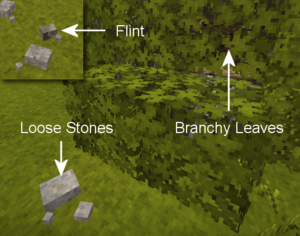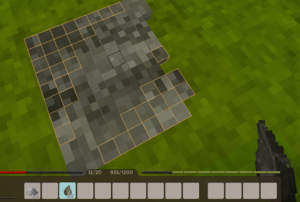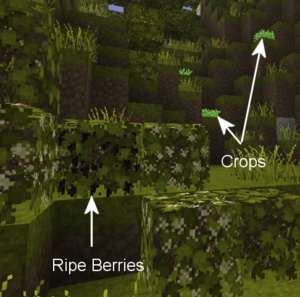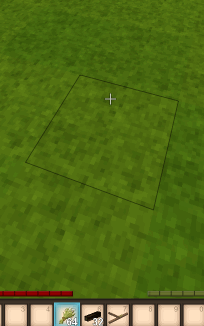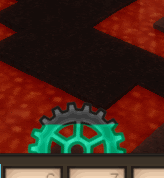Survival Guide - Your first day/de: Difference between revisions
(Created page with "=== Inventar ===") |
(Created page with "=== Nahrung ===") |
||
| Line 79: | Line 79: | ||
To begin expanding player inventory, crafting [[Crafting_Recipes#Portable_Containers|hand baskets]] is the first option. Harvest [[Cooper's_Reed_(Cattail)|reeds]], which can usually be found near lakes. Press <code>H</code> and search for basket to see the grid crafting recipe. | To begin expanding player inventory, crafting [[Crafting_Recipes#Portable_Containers|hand baskets]] is the first option. Harvest [[Cooper's_Reed_(Cattail)|reeds]], which can usually be found near lakes. Press <code>H</code> and search for basket to see the grid crafting recipe. | ||
=== | === Nahrung === | ||
[[File:Black currant and wild crops.png|300px|right|Food scavenging time!]] | [[File:Black currant and wild crops.png|300px|right|Food scavenging time!]] | ||
Revision as of 14:36, 9 February 2021
This guide is a collaboration between many individuals and may have issues. A wonderful member of the community, copygirl, who is a contributor to the Vintage Story code, has compiled a more concise and potentially more user friendly survival guide on her own page. As with the wiki, there is no guarantee on the accuracy of the content and is correct to the best of the author's knowledge.
Controls
Character
| W A S D | To move around |
| Space | Jump |
| E | Backpack Inventory (Access Crafting Grid) |
| C | Character Inventory (Clothes and other Gear) |
| Shift | Sneak (used to place active items on blocks) |
| Ctrl + W | Run |
| G | Sit down |
| Q | Drop currently held item |
| F5 | Cycle through camera modes (first person, third person, overhead) |
User Interface
| tab | Show/Hide chat overlay |
| T | Begin typing in the chat overlay |
| F4 | Show/Hide user interfaces |
| F6 | Show/Hide user minimap |
| B | Show/Hide block info |
| H | Survival Handbook (Most items in the game) |
| M | Show/Hide worldmap |
| N | Show/Hide block interaction help |
| V | Show/Hide coordinates |
| F12 | Take a screenshot |
| esc | Exit/close any interface |
Dein erster Tag
Spieler Spawn
Players appear in the world at the "spawn location". If a player dies in the game, the player will reappear (respawn) at the initial spawn location until the player spawn point is reset. (A way to reset player's spawn location can be found later in the game.) It's a good idea to set a marker for this spawn point when a player first appears in the world. Either right mouse click on the world map or through the command /waypoint add [waypointcolor] [title]. This command adds a waypoint with given color (any .NET Color or a Hex Code) and text.
Steinwerkzeuge
Find flint or loose stones (basalt, granite, andesite, obsidian or peridotite). Sneak + Right click on solid ground to create a knapping surface. Choose the tool to create from the menu. We recommend an Axe and a Knife. Using a stone in the active hand, left click on the orange boxes to remove them from the stone and shape the finished blade or tool head. When the last orange box is removed, the completed tool head will transfer to the player's hotbar. Press E to open the inventory GUI and access the crafting grid. In the grid, combine the stone tool blade with a stick (handle) to create the finished tool. Sticks can be collected from the ground or by breaking leafy branches using left click.
Inventar
Players have 3 types of slots
- The left hand slot can hold passive items such as torches
- 10 hand slots
- 4 container slots that allow players to expand inventory.
To begin expanding player inventory, crafting hand baskets is the first option. Harvest reeds, which can usually be found near lakes. Press H and search for basket to see the grid crafting recipe.
Nahrung
Here are some of the first day options for food:
- Mushrooms can be harvested with a knife or empty hands. Harvesting the tops with a knife will allow the mushrooms to regrow over time.
- Ripe Berry Bushes can be harvested without tools, and then broken and replanted anywhere else. After a while they will start to bloom again.
- Cattail roots can be harvested using a knife and cooked over a fire as a source of early game forage.
- Most animals can be killed and harvested with a knife for nutritious meat and fat. Hold
Sneak + Hold Right mouse buttonwith a knife in hand to harvest animals. Meat must be cooked in a fire pit.
Light / Cooking
Once the sun sets, a player might want to create a firepit as a source of light and for cooking. Be aware though, rain will extinguish any uncovered fires or torches, so be sure to build a simple roof over any firepits.
Gather the following resources:
- Dry grass:
left clickwith a knife in hand to gather tall grass - Firewood:
left clickwith an axe in hand to cut trees and harvest logs. Place the axe and logs in the crafting grid to create firewood.
Hold Sneak + Right click on solid ground with the dry grass in hand to place a fire pit. Next, Sneak + Right click with 4 firewood in hand to complete the fire pit. Then, light the fire using a firestarter (or a torch), hold Right click with either item in hand and aim at the base of the firepit. (Optionally check the handbook, opened with H, to find out how to make a firestarter.)
Congratulations, meat can be cooked and new torches created by heating sticks! Be careful though, a torch in your off hand will cause you to take an increased hunger penalty.
Combat
To defend against hostile creatures, craft stone age weapons by knapping or carving a club from a log. Different weapons have different ranges. Spears are the strongest long range weapon in the stone age, but break quickly. Create a stone spearhead by knapping, and combine with a stick (shaft) in the crafting grid to finish the spear. Wooden clubs are durable but have less damage and less range. Knives, axes, or just plain sticks can all be used as weapons, but these have shorter ranges than the spear. In an emergency, small stones can be thrown at mobs. For more information, see the main article on Combat
Improvised armor can be crafted from dry grass and firewood for some very basic protection. It will not protect your head or legs, but is better than nothing. Once more established in the world of Vintage Story, more advanced types of armor can be crafted.
Shelter
Once the sun sets, a player might also like a shelter. There are different blocks that you can use to make a shelter using the early resources you have available. Dry grass can be used to make a bed early on, or form hay blocks/cob for early building blocks. Soil is also a good building material, and can be used to form Mud Bricks.
Temporal Stability
By now a player might be wondering about the cyan gear between the health and satiety bar. This is the temporal stability meter, the level of color in the gear indicates the player's current temporal stability. As a player's temporal stability reduces, the gear turns counter clockwise and the blue color in the gear decreases. When increasing, the gear's color returns as it turns clockwise. If temporal stability reaches zero, the player's vision will change drastically, and bad things tend to happen.
Draining temporal stability:
- Some surface areas are temporally unstable
- Caves, underground caverns, and places below surface level are generally more unstable than the surface of the world
- Temporal storms (occur at regular intervals)
Recovering temporal stability:
- Move to a location of high stability on the surface or at higher elevations in the world
- Transfer the temporal stability from a temporal gear: hold the gear in the left hand, a knife in the right hand, and hold
right mouse buttonto provide a 30% boost - Killing drifters recovers small amounts of your own temporal stability
Advanced Game Mechanics
Once the basics are mastered, players can develop advanced technology: Survival Guide - Advanced tech
Tutorial Video: First Day
Thanks to Ashantin for creating and sharing with the VS community.
| {{{title}}} | |
|---|---|
